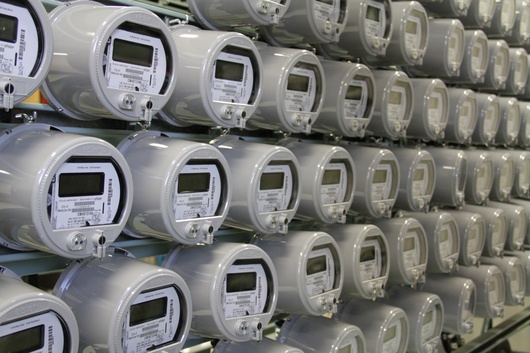
For a smart energy debate in Europe
Published on
In face of current geopolitical developments, concerns over the security of gas supply in Europe dominate current political and media debates.
Here is why a consumer-oriented debate is needed on smarter energy consumption in Europe.
At a time when the climate and energy portfolios have never been so interlinked in EU policy-making, when a Vice-President of the Energy Union is up and running, and where security of supply and sustainable energy are on everyone’s lips; promoting a fit-for-purpose and forward-looking energy policy seems to hold the key to many of EU policy-makers’ headaches.
The momentum for a more harmonised, sustainability-focused EU energy policy has been around for some time: keywords such as energy efficiency targets, energy security of supply, renewable energy sources etc, and most recently an Energy Union are unmistakably in the air. Why is that so and how is the EU approaching this ?
Latest geopolitical consequences for energy management in Europe
Recent political turmoil between Ukraine and Russia first raised up the stakes of decreasing the EU’s energy dependence, thereby also re-launching high-level discussions around the security of the EU’s gas supply. Gas has thus become a widespread leitmotiv in Brussels when debating energy issues. And the recent gas rapprochement between Greece and Russia only brought up further concerns down the pipelines, primarily over Russia’s energy “dictatorship”.
If gas was yet again a core agenda item at the latest informal Energy Council, the debate also highlighted other major priorities on the EU’s energy agenda: a consumer-oriented implementation of the Energy Union, an enhancement of demand-side flexibility and demand-response solutions, and opportunities of preventing energy poverty. Regarding financing instruments, the “Juncker” plan for a European Fund for Strategic Investments (EFSI) should provide significant financial assistance for energy infrastructure projects and is meant to support inter alia investments in energy efficiency.
Reviewing Europe’s energy market design with prosumers
 Beyond what seems to be macro-level and abstract energy policy-making, one approach in understanding these energy challenges is to focus on more micro-level issues, and by looking at us, consumers. Consumers are supposed to be at the centre of the 15 actions points of the planned Energy Union, but for that, several bigger structural changes are needed, e.g a revised energy market design, for which the European Commission should issue a proposal this summer. This will be essential in ensuring consumer empowerment and consumer choices of their energy supplier. In that regard, the Network Balancing Code, developed by the European Network of Transmission Systems Operator (ENTSO-E), the Commission and the Agency for the Cooperation of Energy Regulators (ACER), will be of great importance to guarantee capacity mechanisms enabling demand-side management and to reward energy flexibility, for which unbundling and full independence of energy aggregators will be paramount. But what could be the consumer’s role in all that ?
Beyond what seems to be macro-level and abstract energy policy-making, one approach in understanding these energy challenges is to focus on more micro-level issues, and by looking at us, consumers. Consumers are supposed to be at the centre of the 15 actions points of the planned Energy Union, but for that, several bigger structural changes are needed, e.g a revised energy market design, for which the European Commission should issue a proposal this summer. This will be essential in ensuring consumer empowerment and consumer choices of their energy supplier. In that regard, the Network Balancing Code, developed by the European Network of Transmission Systems Operator (ENTSO-E), the Commission and the Agency for the Cooperation of Energy Regulators (ACER), will be of great importance to guarantee capacity mechanisms enabling demand-side management and to reward energy flexibility, for which unbundling and full independence of energy aggregators will be paramount. But what could be the consumer’s role in all that ?
A plea for smart grids and demand-response
Taking the example of electricity as energy source, it appears useful to grasp how consumers may contribute at their level to increasing energy efficiency and enabling more flexibility on the electricity grid. This was one of the topics of the InnoGrid+2020 high-level conference organised on the 1st of April by ENTSO-E and the European Distribution Systems Operators (EDSO). With the Commission pushing for the timely roll-out of smart grids, consumers should be able to get involved more easily in the energy system, notably through smart meters and smart appliances, which provide information directly to the consumers on their consumption levels, but also on high and low peak times where electricity prices vary. This should in turn allow consumers to make more informed choices about their electricity provider, but also to evaluate how they can save energy whilst paying less for it.
 Smart grids entail significant potential which is already acknowledged by many actors in the field and in academia. Yet implementation challenges have emerged, notably related to ICT issues but also to contractual arrangements required between balancing service providers and retailers. Despite the complexity of a European-wide smart meter roll-out and of an energy system based on demand-response, more attention should be given to such innovative solutions and to the promises they hold for energy savings and energy responsibility in Europe.
Smart grids entail significant potential which is already acknowledged by many actors in the field and in academia. Yet implementation challenges have emerged, notably related to ICT issues but also to contractual arrangements required between balancing service providers and retailers. Despite the complexity of a European-wide smart meter roll-out and of an energy system based on demand-response, more attention should be given to such innovative solutions and to the promises they hold for energy savings and energy responsibility in Europe.



